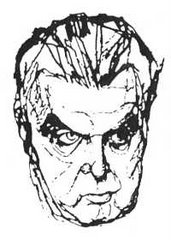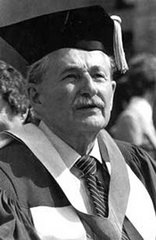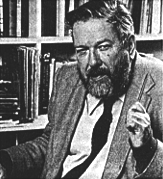King Ed
I'll admit it: I was one of the (first?) people to predict that Ed Stelmach would spell the end of Tory rule in Alberta. If history was any guide, all signs pointed to disaster for the PC's.
As the story goes, Alberta government parties decline as suddenly as they rise. The pattern: an upstart party comes out of the wilderness, under a charismatic leader, to oust a long-standing governing party, sending the latter into oblivion (never to rule again).
In 1921, the UFA came out of nowhere to upset the Liberals, who have never fully recovered. In 1935, Social Credit did the same, governing the province for 36 years. The Tories dispatched the Socreds in 1971 and have ruled Alberta ever since. The "three leader rule" applied in each case (i.e., each government lasted precisely three premiers). In the last two cases, the governing UFA and Socreds had just replaced a charismatic leader with a 'dud', who languished in the shadow of his predecessors. (Most of us know John Brownlee and Ernest Manning, but has anyone heard of Richard Gavin Reid or Harry Strom?).
With the exception of the fact that Ralph Klein bucked the "three leader" rule -- like Lougheed and Getty before him, he retired without losing an election -- all signs pointed to the Conservatives' demise under Stelmach.
This won't happen. Stelmach will win the next election. Historically, there have been four factors that, when mixed in various combinations, have contributed to the fall of Alberta governments: a domineering opposition leader and a relatively underwhelming premier; a prevailing social movement; political scandal; and/or heightened political involvement by average citizens. Arguably none of these exists today. Here's what I mean.
(1) There is a real lack of alternatives... Granted, at the time, no one could have predicted that the UFA, Social Credit or PC's would have made their breakthroughs as dramatically as they did. But, with hindsight, at least we could see the rumblings of change in the air.
In the first case, the UFA was part of a larger 'progressive' movement that had caught the West by storm following WWI. Unless the Alberta Greens show dramatic improvement in the coming months, I don't foresee any social movements coalescing into a viable political party.
In the second case, Social Credit contested several elections before it made its breakthrough in 1935. Plus, it was aided by a scandal involving the UFA's leadership. Unless you forsee the Alberta Alliance emerging as a major force outside the rural south, and unless you think 'Honest Ed' has skeletons in his immaculately-kempt closet, Stelmach is safe.
In the third case, the Conservatives were re-born under the leadership of Peter Lougheed, who --from the moment he assumed the party's leadership in 1967 -- was seen as a threat to the established order. By all accounts, Lougheed was seen as a visionary, charismatic leader -- in stark contrast to Premier Strom (selected in 1968). Sure, Stelmach has Strom-like qualities, but so do his competitors. I don't care which stripe you wear: No one can compare Brian Mason or Kevin Taft to William Aberhart or Peter Lougheed. Standing on soapboxes in empty warehouses and writing books doesn't compare with a fire-side chat or barn-storming leader's tour.
(2) The federal Liberals have stacked the deck against their provincial cousins by putting the environment at the top of the political agenda. And Grits in Ottawa and Edmonton know it. As the Leader of the Official Opposition in Alberta, Kevin Taft still can't shake his party's association with the National Energy Policy -- memories of which have only been rekindled by Stephane Dion's provocation of the Oil Patch. The Alberta Tories -- like the UFA and Socreds before them -- were most successful when they portrayed themselves as the defenders of Alberta's interests. (Fights against Ottawa were the major catalysts for Greenfield's election in 1921, Aberhart's rise in 1935, and Lougheed's consolidation in 1975.) In short, the federal Liberals have handed Ed his first election by pushing him to the podium in defence of Alberta. If he were facing a formidable foe in Ottawa, the story might be different. But he's got a friend in Stephen Harper. Ed won't lose on this count, either.
(3) Stelmach is not a mere 'continuity' premier.... Neither Reid nor Strom had anything 'new' to offer voters following the resignations of Brownlee and Manning. Theirs were 'stay the course' platforms, and neither was any match for the ambitious platforms unveiled by Aberhart and Lougheed. Even if he wanted to do the same, Ed doesn't have that option. Bluntly put, there is no 'course' upon which he can stay. Ralph Klein has admitted, himself, that he had no long-term vision for Alberta, no plan to deal with growth. Ed's vision -- outlined in today's Throne Speech -- was the first real blue-print for Alberta's future since Klein's own 'revolution' in the early 1990s. In some ways, this offers Ed an opportunity to do precisely what Ralph did: to reinvent the party in his own starkly-different image. This is how Klein broke the "three-leader rule", and Stelmach can't help but continue the tradition of discontinuity. Any plan is a change from 'no plan', and Ed didn't have to do much to better Kevin Taft's lackluster "alternative throne speech" from last week. Again: advantage Ed.
In short....
Unless the Green movement or some Alberta-first/western separation party (the WCC2?) emerges to capture the public's attention... Unless Ed is embroiled in some massive scandal.... Unless Kevin Taft or Brian Mason are replaced or have personality make-overs.... Unless there's someone lurking in the political wilderness with the organizational and motivational skills to build a political party from the ground-up.... And unless any of this happens within the next 12 months.... Premier Ed Stelmach will win his first election.
Chances are, judging from recent opinion polls, most Albertans wouldn't be paying attention if any of that happened, anyway. Long live King Ed. The dynasty continues.





1 comment:
Genial post and this post helped me alot in my college assignement. Say thank you you on your information.
Post a Comment